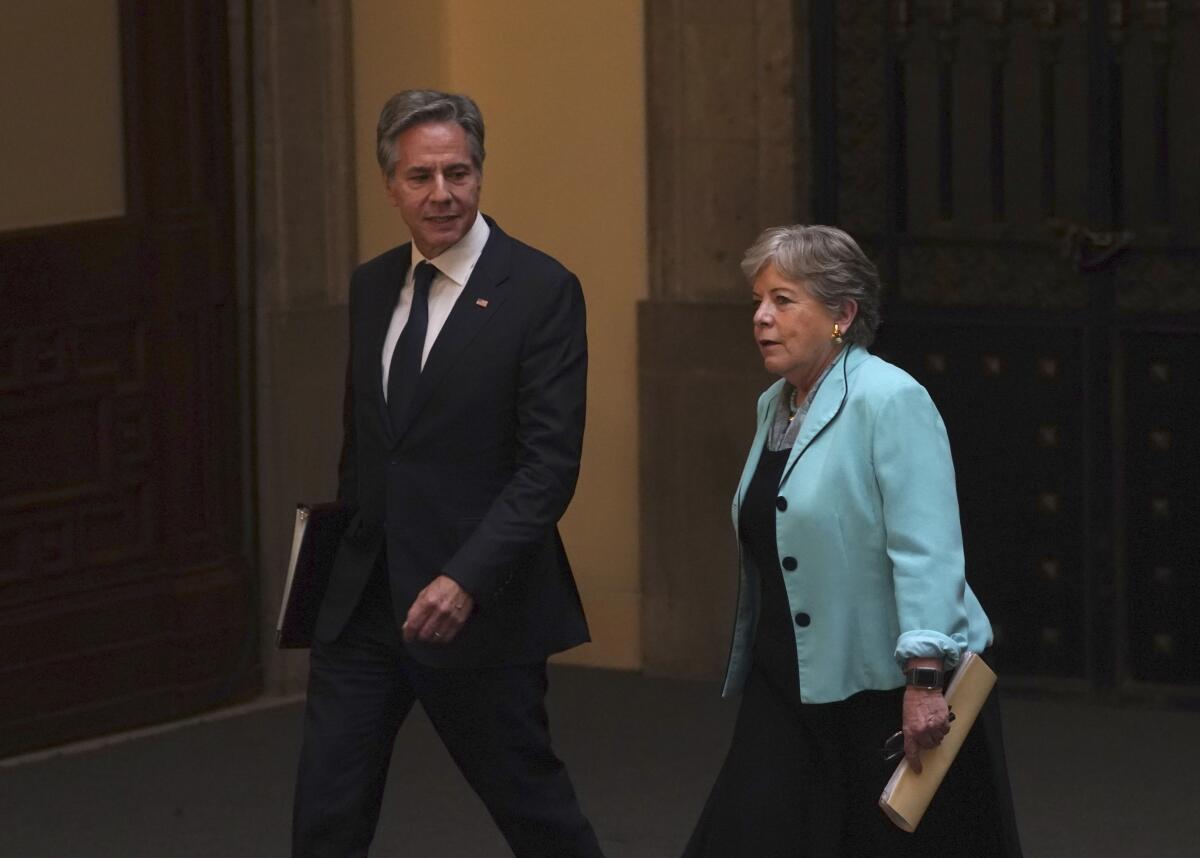U.S. presses for cooperation from Mexico on fentanyl, but results are mixed

- Share via
MEXICO CITY — Branding the scourge of fentanyl deaths the “top of the agenda,” America’s senior diplomat on Thursday implored Mexico to help stop the flow of the drug into the U.S., but it was unclear whether he received a meaningful commitment from Mexican President Andrés Manuel López Obrador.
Secretary of State Antony J. Blinken, in Mexico City for a series of high-level security and economic talks, said in a news conference he had “no doubt about Mexico’s commitment to working collaboratively ... a commitment in words and deeds.”
But López Obrador has been slow to acknowledge the depths of the fentanyl crisis, preferring until recently to blame U.S. consumption and not the role of Mexico in production and supply of the synthetic opiate, which is fabricated using chemicals from China.
Mexican Foreign Affairs Secretary Alicia Bárcena vowed to fight the trafficking of fentanyl, focusing on controlling the precursor chemicals, while Secretary of Security and Citizen Protection Rosa Icela Rodríguez insisted that Mexico was not a producer of the drug but merely a transit point — a notion that U.S. officials say is no longer the case.
Blinken outlined a detailed plan for tracing chemicals in Mexico that will recruit private companies along with government agencies to step up raids and crack down on those who produce and traffic the drugs,and level sanctions against Chinese companies that are the major source for the chemicals.
“We are doing everything in our power to stop the shipment into Mexico of the precursor chemicals and pill presses and the shipment of the drug into the U.S.,” said Homeland Security Advisor Liz Sherwood-Randall, who accompanied Blinken.
Blinken and López Obrador met for about an hour behind closed doors, with no access for journalists. A brief summary of the meeting provided by the State Department said the two “discussed the challenges presented by irregular migration and synthetic fentanyl and our efforts to address them.”
According to the summary, Blinken thanked the Mexican president for his country’s extradition last month of Ovidio Guzmán López, a son of Joaquin “El Chapo” Guzmán, the notorious imprisoned leader of the Sinaloa cartel, considered one of Mexico’s largest producers of fentanyl.
In the meeting, López Obrador spoke of the importance of open channels of communication and “this relationship of understanding and friendship” that will assist in confronting shared problems and challenges, Mexican news media reported.
The two days of talks here follow similar sessions last week in Washington involving Blinken and Cabinet members from both governments. Blinken was joined in Mexico by U.S. Atty. Gen. Merrick Garland and Homeland Security Secretary Alejandro N. Mayorkas.
In opening remarks, Mexican officials praised cooperation but offered no specific plans of action.
“We are committed to fighting synthetic drugs that have caused so much damage to the U.S.,” Bárcena said. She urged greater investment and technological innovation for the U.S.-Mexico border that would facilitate trade but also bolster security against the trafficking of drugs headed north and weapons headed south.
Mayorkas announced a new system in which the U.S. will share regular reports with Mexico on weapons believed to be destined for that country.
Rodríguez said drugs and violence are part of a “vicious circle” that can be overcome only “with binational solutions … working from both sides of the border.”
Blinken frequently cites this disturbing statistic: Overdoses from fentanyl, a substance often concealed in other drugs, are now the leading cause of death in U.S. adults ages 18 to 49. Moreover, use of and death from fentanyl are no longer an exclusively U.S. problem, Blinken has said.
“We’ve been the canary in the coal mine,” Blinken said during an appearance at the University of Texas at Austin on Wednesday. “Now we’re seeing it spread to many other places in the world. … This is becoming a global problem.”
Mexican officials cite numerous raids on illicit drug operations on national territory and destruction of laboratories — 900 this year alone — as evidence of the government’s commitment to cracking down on the fentanyl trade. However, only a tiny percentage of those operations have targeted fentanyl production, according to U.S. officials.
Migration also dominated the talks, another issue for which the U.S. and Mexico have a “shared responsibility,” Blinken said.
Mayorkas spoke of formulating an “effective model” for immigration. But his comments came as the Biden administration announced it was resuming limited construction of a southern border wall, which López Obrador has sharply criticized. Mayorkas said that funds for the construction were appropriated during the Trump administration and that the law requires the money be spent for that purpose.
In his daily morning news conference earlier in the day, López Obrador lamented the decision.
“Until now, he had been the only president who had not built a border wall,” López Obrador said of President Biden. “I understand there are strong pressures from extreme right-wing groups in the United States, especially those who want to take advantage of the migration phenomenon and drug consumption for electoral purposes.”
Also in Mexico City, Binken and Mayorkas conferred with their counterparts from Colombia and Panama and reached a decision to begin deporting Venezuelan nationals who do not have a legal basis to remain in the U.S., the State Department said.
Venezuela has agreed to receive the deported nationals, the department said in a statement.
More to Read
Get the L.A. Times Politics newsletter
Deeply reported insights into legislation, politics and policy from Sacramento, Washington and beyond. In your inbox twice per week.
You may occasionally receive promotional content from the Los Angeles Times.










